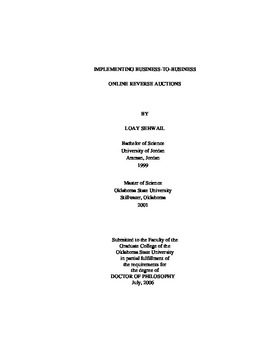| dc.contributor.advisor | Ingalls, Ricki Gene | |
| dc.contributor.author | Sehwail, Loay | |
| dc.date.accessioned | 2013-12-10T18:05:05Z | |
| dc.date.available | 2013-12-10T18:05:05Z | |
| dc.date.issued | 2006-07 | |
| dc.identifier.uri | https://hdl.handle.net/11244/7780 | |
| dc.description.abstract | Scope and Method of the Study: The purpose of this study was to address the gap in the academic literature by developing and testing a model to successfully implement online reverse auctions with respect to: (1) reducing purchase prices, and (2) developing/maintaining buyer-supplier strategic alliance relationships. A survey was sent to 603 members of the Institute of Supply Management who reported to be in purchasing/supply management role. Companies were surveyed to determine the effect of auction design and purchase type on the "successful" implementation of reverse auctions, in terms of the reduction in purchase price and the success of buyer-supplier strategic alliance. The measures developed by Mohr and Spekman (1994) and Monczka et al. (1998) were used to assess the "successful strategic alliance" and its critical antecedents including attributes of the relationship (trust, commitment, coordination and interdependence), communication behavior (information quality, participation and sharing) and conflict resolution techniques. | |
| dc.description.abstract | Findings and Conclusions: The research concluded that for the purpose of reducing purchase prices (1) companies prefer to use open-bid rather than sealed bid auctions, (2) companies prefer to organize auctions with the help of a market maker than in-house, (3) an average of 14.4% is the reduction in purchase prices when using online reverse auctions to outsource products. The research study also concluded that online reverse auctions are used for: (1) either the short-term or the long-term and not for both when purchasing any type of product, (2) the long-term when larger size companies outsource production items and material, (3) the short-term when smaller size companies outsource MROs and/or services. The research found that from the perspective of the buying company in the alliance, the following were found to be significantly related to partnership success: trust, coordination, communication, information quality, information participation, information sharing, joint problem solving, persuasive attempts, and low use of avoidance and destructive conflict resolution tactics. Buyers did not find any significant relationship between the auction application and the predictors of success of supplier strategic alliances. Finally, the study concluded that buyers value the importance of the strategic relationships with their suppliers more than the promised reduction of purchase prices when outsourcing products/services using online reverse auctions. | |
| dc.format | application/pdf | |
| dc.language | en_US | |
| dc.rights | Copyright is held by the author who has granted the Oklahoma State University Library the non-exclusive right to share this material in its institutional repository. Contact Digital Library Services at lib-dls@okstate.edu or 405-744-9161 for the permission policy on the use, reproduction or distribution of this material. | |
| dc.title | Implementing business-to-business online reverse auctions | |
| dc.contributor.committeeMember | Pratt, David B. | |
| dc.contributor.committeeMember | DeYong, Camille F. | |
| dc.contributor.committeeMember | Warde, William D. | |
| dc.contributor.committeeMember | Tilley, Daniel S. | |
| osu.filename | Sehwail_okstate_0664D_1888.pdf | |
| osu.accesstype | Open Access | |
| dc.type.genre | Dissertation | |
| dc.type.material | Text | |
| dc.subject.keywords | reverse auctions | |
| dc.subject.keywords | e-procurement | |
| dc.subject.keywords | collaborative negotiation | |
| dc.subject.keywords | collaborative partnerships | |
| dc.subject.keywords | strategic alliances | |
| thesis.degree.discipline | Industrial Engineering and Management | |
| thesis.degree.grantor | Oklahoma State University | |
